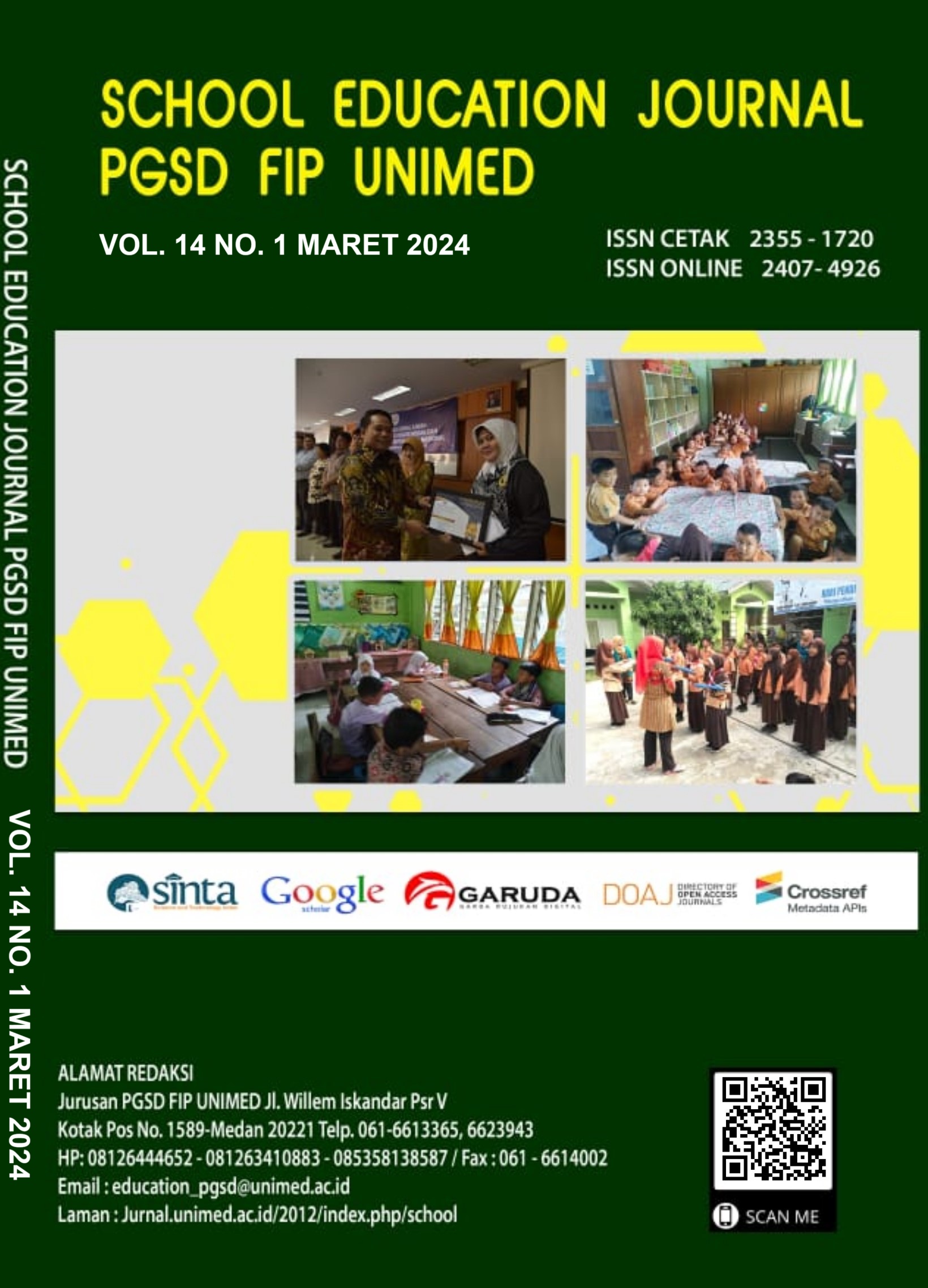ADAPTASI TEKNOLOGI BERBASIS CANVA BAGI GURU SEKOLAH DASAR DALAM PROGRAM KAMPUS MENGAJAR BATCH 5
DOI:
https://doi.org/10.24114/sejpgsd.v14i1.58228Keywords:
Technology Adaptation, Canva Application, Teachers, Kampus MengajarAbstract
Technology adaptation is the process of changing the way people interact with technology to meet their evolving needs or overcome new challenges. Technological adaptation is used in the world of education to support teacher skills in the teaching and learning process. One of them is in the Class 5 Kampus Mengajar program at SD Negeri 4 Bantrung. This research aims to describe how Canva-based technology is adapted by teachers at SD Negeri 4 Bantrung in the Class 5 Kampus Mengajar program. Data collection techniques in this research include observation, interviews and documentation. Meanwhile, data analysis techniques with steps include data collection, data reduction, data presentation and drawing conclusions. The result of this research is increased teacher creativity in creating learning media using Canva technology. Apart from that, these results have an impact on students' enthusiasm and enthusiasm for learning because the teachers use interesting learning media from the results of Canva-based technology adaptation trainingReferences
Ashari, Y. A., Setiawan, F., & Mirnawati, L. B. (2022). Peran Mahasiswa Dalam Membantu Adaptasi Teknologi Terhadap Guru Pada Program Kampus Mengajar 1 Di Sd Pelita Bangsa Surabaya. Autentik : Jurnal Pengembangan Pendidikan Dasar, 6(1), 42“53. https://doi.org/10.36379/autentik.v6i1.164
Budiarti, E., Susanti, A., Elliza, E., & Purwanti, E. (2023). Pemanfaatan Aplikasi Canva sebagai Video Pembelajaran untuk mengenalkan Konsep Bilangan Kelompok Usia 4-5 Tahun di TK Ceria Kabupaten Pasuruan. AKSARA: Jurnal Ilmu Pendidikan Nonformal, 9(3), 1821“1838.
Faisol, A., & Chasanah, S. L. (2022). Pelatihan Canva Dalam Pembuatan Media Pembelajaran Bagi Guru- Guru SMK Di Bandar Lampung. 3(3), 193“202. https://doi.org/10.23960/jpkmt.v3i3.96
Fajriyah, D. N., Zumrotun, E., & Attalina, S. N. C. (2023). Peran Mahasiswa Kampus Mengajar dalam Adaptasi Teknologi Canva terhadap Guru di SD Negeri 3 Tunahan. Qalam: Jurnal Ilmu Kependidikan, 12(2), 33“41.
Hajar, O., Kasiyun, S., Susanto, R. U., & Akhwani, A. (2023). Pengaruh Media Pembelajaran Berbasis Aplikasi Canva Terhadap Minat Belajar Siswa Kelas V di Sekolah Dasar. Journal on Education, 6(1), 6404“6413.
Hasan, N., & Mudjrimin, J. (2023). Pelatihan Penggunaan Media Pembelajaran Berbasis Aplikasi Canva Education di SD 256 Malimongeng. PENDIMAS: Jurnal Pengabdian Masyarakat, 2(1), 33“37. https://doi.org/10.47435/pendimas.v2i1.1892
Miles, M. B., & Huberman. (2014). Analisis Data Kualitatif Buku Sumber Tentang Metode-Metode Baru. Jakarta. Penerbit Indonesia Press (UI Press).
Nurjannah, N., Nurfadhilah, N., Nurfiana, N., & Danial, D. (2023). Pelatihan Pemanfaatan Aplikasi Quizalize Dalam Pembelajaran Siswa Di Man 2 Sinjai. Catimore: Jurnal Pengabdian Kepada Masyarakat, 2(1), 48“54.
Qur™ani, B., Suryana, S., & Hamsar, I. (2023). Training on making Interesting Percentage Learning Media Using Canva. IMPACTS: International Journal of Empowerment and Community Services, 2(1), 45“54.
Ratnawati, D., Vivianti, V., Fatmawati, S., Widodo, T., & Hardiyantari, O. (2023). Peningkatan Keterampilan Guru Dalam Pengembangan Media Pembelajaran Menggunakan Canva. BANTENESE: Jurnal Pengabdian Masyarakat, 5(2), 516“526.
Resmini, S., Satriani, I., & Rafi, M. (2021). Pelatihan penggunaan aplikasi canva sebagai media pembuatan bahan ajar dalam pembelajaran bahasa inggris. Abdimas Siliwangi, 4(2), 335“343.
Rizanta, G. A., & Arsanti, M. (2022). Pemanfaatan Aplikasi Canva sebagai Media Pembelajaran Masa Kini. Prosiding Senada (Seminar Nasional Daring), 560“568.
Downloads
Published
Issue
Section
License
Authors whose manuscripts are approved are approved as follows:
The publication rights for all journal manuscript materials published/published on the SEJ (School Education Journal) E-Journal site are held by the editorial board with the author's knowledge (moral rights remain with the manuscript authors).
The formal legal requirements for accessing this electronic digital journal article are subject to the terms of the Creative Commons Attribution-ShareAlike (CC BY) license, which means that E-Journal SEJ (School Education Journal) has the right to store, transfer media/format, manage in the form of a database, maintain, and publish articles without asking permission from the author as long as the author's name remains as the copyright owner.
Manuscripts published/published electronically are open access for educational, research, and library purposes.

